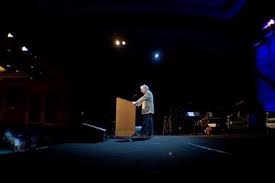I am currently reading Marilynne Robinson’s newest collection of essays, titled The Givenness of Things.
As she has with all her previous writings, Robinson is making me think in new ways about the topics she ruminates on in this volume. I suppose that is the mark of a good author.
One of my favorite essays in the book so far, is a chapter on the Reformation. She provides much history that I was not aware of, along with excellent explanation from a literary perspective.
The reason an understanding of the reformation from a literary perspective is so very important, is this: the Reformation was instrumental in getting scripture (and therefore, the Gospel) into the hands of the citizens, in a form that they could read and understand.
No longer was scripture only something that was accessible by the Priests and high church officials who were educated in Latin. Instead, through the works of Wycliffe and Tyndale and the protestations of Luther and the works of Calvin, scripture was translated into the vernacular of the times. As a result, that which once seemed unattainable was suddenly attainable–the common worker had access to the Gospel. And, in having that access in a form that they could read and understand–or could be read to them in a language that they could grasp–simplified the message. And that simplified accessibility changed lives.
Robinson goes on, in this chapter, to explore other fascinating aspects of the Reformation, but I want to pause here a bit: Simplicity of the Message.
I wonder if we, today, in 2015, tend to miss the simplicity of the Gospel.
I know that I do.
Today, we have scripture in the most accurate translations available to us, via the work of scholars throughout hundreds of years. And, all things considered, it really isn’t that hugely complicated. God is creator God. God is holy and can not abide sin. We are a people who sin. Our sin must be paid for. God sent His son, Jesus, to die for our sins. He died, and then was raised; we are justified through his death and resurrection. We are called to obedience.
And, there will be a day, when we will be called Home, and will see our Savior face-to-face.
It is, a simple message.
Oh, that doesn’t mean that we can even remotely understand the “How” of the message. Or the “Why” of the message. And that trips me up sometimes–sometimes I get so wrapped up in the “How” and “Why” questions that race across my brain when I am studying scripture, that I miss this simple message: John 3:16:
If you spent any time around evangelical churches in your growing up years, there is a good chance that this verse may have been the first verse you learned: maybe in Sunday School, or as a part of a Vacation Bible School challenge. I know I probably memorized it to get a “gold star” on a chart in my Sunday School classroom.
But the result of that has been that we sometimes gloss over this verse as being too simplistic; as being a verse for children to memorize.
And we miss the beautiful-ness of it. The simplicity of the truth. God loved us–enough to give His son, so that we would not perish.
Mercy. Forgiveness. Grace.
So maybe we need to fight the urge or the pull to complicate the gospel.
Oh, some of us (pointing at myself here) will always be pulled in the direction that says “This is too complicated. You can’t believe or trust God until you have examined this thing from every angle, inside and out, and have understood and defined it.” Always, that will be my bent.
But maybe in recognizing that, I–and we–can work hard to settle in the simplicity of the message that we are loved, and that John 3:16–as simple as it is–is truth.
And we can share that message to the hurting world in need of hope.


